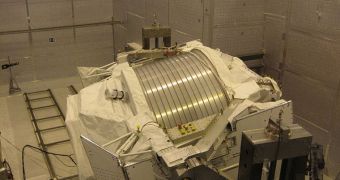The most important payload that the space shuttle Endeavor will deliver to the International Space Station during its final mission will be the Alpha Magnetic Spectrometer, the most advanced and expensive scientific instrument ever flown to space.
At this point, engineers at the Kennedy Space Center (KSC), in Florida, are readying the device for its planned, April 18 trip to space aboard the STS-134 mission. This will be the last time Endeavor takes off. When it returns, it will be decommissioned, and sent to a museum.
The spectrometer will be tasked with finding and studying elementary particles that may provide physicists with a better understanding of some of the most elusive mysteries in the Universe.
Its investigations may for example help answer key questions about the nature of dark energy, the force believed to be responsible for making galaxies fly farther apart from each other, as the Cosmos is expanding, Space reports.
Its datasets will also help astrophysicists get additional insight into the nature of dark matter, the elusive substance believed to make up the bulk of galactic masses. The amount of normal matter in a given galaxy is usually too low to explain the object's gravitational pull.
As such, experts have proposed the existence of dark matter. In theory, the stuff only interacts with normal matter via gravity, and exerts no other direct, observable effect on its surrounding areas.
By analyzing high-energy cosmic rays, the AMS may also provide a deeper insight into the properties of antimatter, and also into its spread across the Universe. The experiment is valued at $1.5 billion.
“The most exciting objective of AMS is to probe the unknown – to search for phenomena which exist in nature that we have not yet imagined nor had the tools to discover,” explains physicist Samuel Ting.
He is the principal investigator of the AMS experiment, and is based at the Massachusetts Institute of Technology (MIT), in Cambridge. The scientist is also the recipient of the 1976 Nobel Prize in Physics, for the discovery of a flavor-neutral meson called the J/ψ particle.
Ting believes that the AMS could really make a contribution to this field of research. The instrument is currently housed in a KSC Orbiter Processing Facility (OPF), while engineers are packing it in a fairing that will protect it during launch.
It will be outfitted into Endeavor's payload bay on March 25, ahead of a planned April 18 launch date. The entire instrument weighs more than 15,000 pounds (6,800 kilograms).
According to NASA officials, it took more than 600 physicists at 60 institutions in 16 countries to construct, test and operate the AMS. The experiment is managed by the US Department of Energy (DOE).

 14 DAY TRIAL //
14 DAY TRIAL //